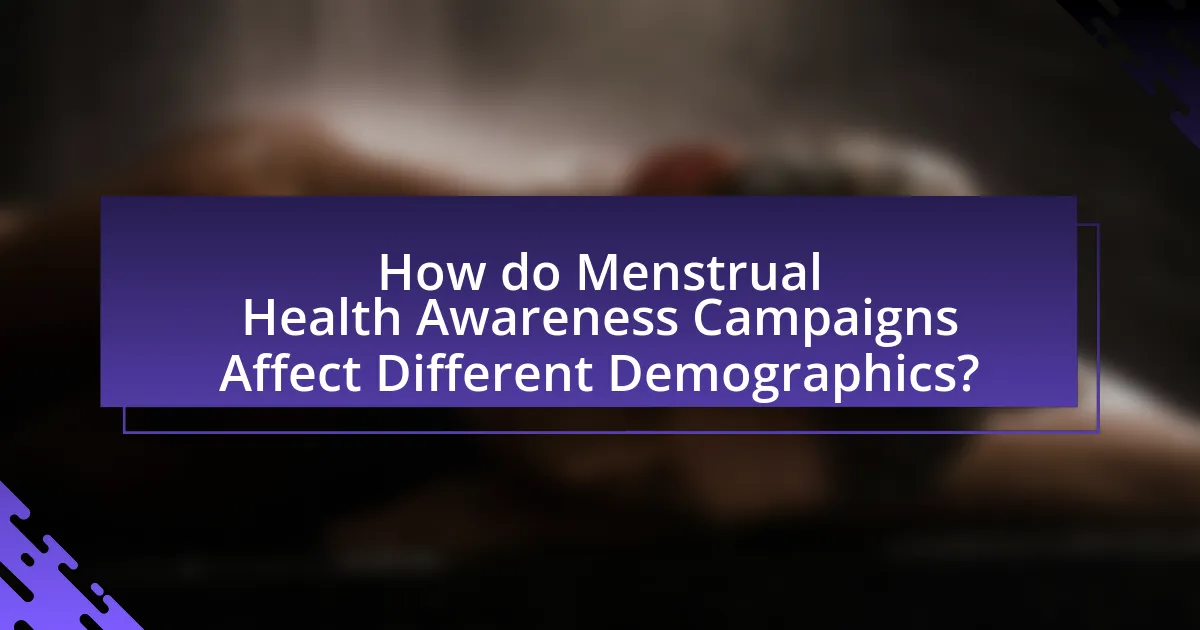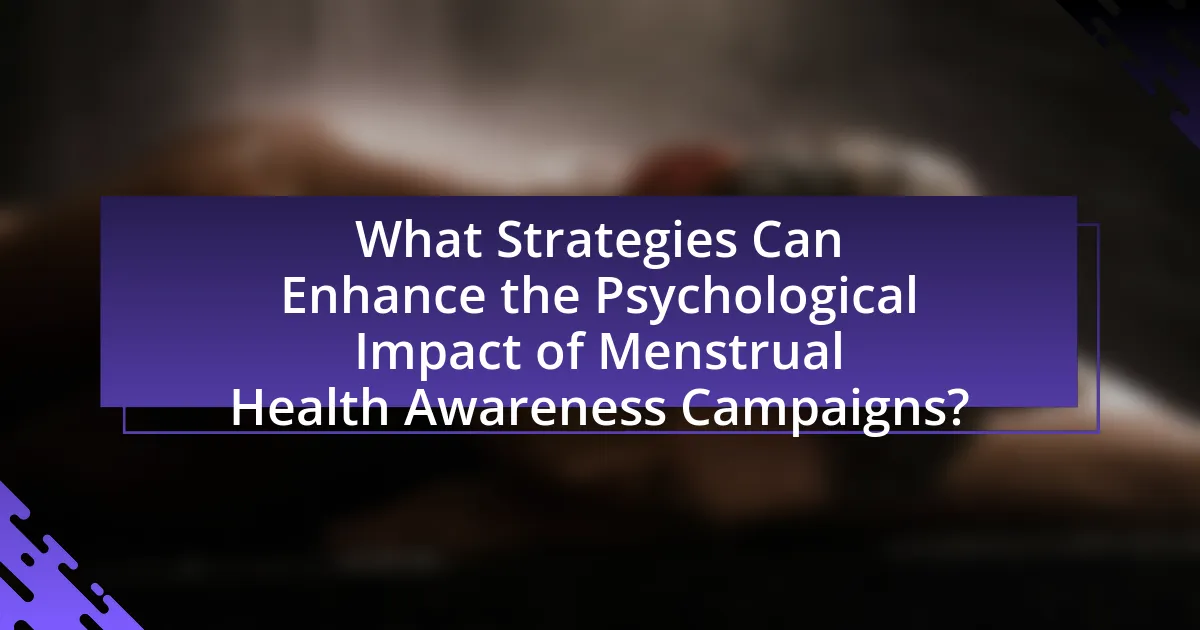The article examines the psychological effects of menstrual health awareness campaigns, highlighting their role in reducing stigma and enhancing knowledge about menstrual health. It discusses how these campaigns positively influence women’s mental health by improving self-esteem, reducing anxiety, and fostering open discussions about menstruation. The article also addresses the potential negative psychological impacts, such as increased anxiety due to misinformation, and emphasizes the importance of culturally sensitive approaches in campaign design. Additionally, it outlines strategies for enhancing the psychological impact of these campaigns through community engagement, storytelling, and feedback from target audiences.

What are the Psychological Effects of Menstrual Health Awareness Campaigns?
Menstrual health awareness campaigns positively impact psychological well-being by reducing stigma and increasing knowledge about menstrual health. These campaigns foster open discussions, which can alleviate feelings of shame and isolation often associated with menstruation. Research indicates that increased awareness leads to improved self-esteem and body image among individuals who menstruate, as they feel more informed and empowered regarding their health. For instance, a study published in the Journal of Adolescent Health found that participants exposed to menstrual health education reported lower anxiety levels and greater confidence in managing their menstrual health.
How do these campaigns influence women’s mental health?
Menstrual health awareness campaigns positively influence women’s mental health by reducing stigma and increasing knowledge about menstrual health. These campaigns provide education that empowers women, leading to improved self-esteem and reduced anxiety related to menstruation. Research indicates that women who participate in such campaigns report lower levels of stress and greater confidence in managing their menstrual health, as highlighted in a study published in the Journal of Women’s Health, which found that awareness initiatives significantly decreased feelings of shame and embarrassment associated with menstruation.
What specific psychological benefits can arise from increased awareness?
Increased awareness can lead to specific psychological benefits such as reduced anxiety, improved self-esteem, and enhanced emotional regulation. Research indicates that heightened awareness of menstrual health can empower individuals, fostering a sense of control over their bodies and experiences. For instance, a study published in the Journal of Health Psychology found that participants who engaged in menstrual health education reported lower levels of anxiety and greater confidence in managing their menstrual symptoms. This empowerment can also contribute to better emotional regulation, as individuals who understand their menstrual cycles are more likely to anticipate and manage mood fluctuations effectively.
How do these campaigns impact self-esteem and body image?
Menstrual health awareness campaigns positively impact self-esteem and body image by promoting acceptance and normalizing discussions around menstruation. These campaigns often challenge societal stigmas, leading to increased confidence among individuals who menstruate. Research indicates that when individuals feel supported and informed about their menstrual health, they report higher self-esteem levels and a more positive body image. For instance, a study published in the Journal of Health Psychology found that participants exposed to menstrual health education reported a significant decrease in body shame and an increase in self-acceptance. This evidence underscores the beneficial effects of such campaigns on psychological well-being.
Why is menstrual health awareness important for psychological well-being?
Menstrual health awareness is crucial for psychological well-being because it helps reduce stigma and misinformation surrounding menstruation, which can lead to improved mental health outcomes. When individuals are educated about menstrual health, they experience less anxiety and shame related to their menstrual cycles, fostering a more positive self-image and emotional stability. Research indicates that comprehensive menstrual health education can significantly decrease feelings of isolation and promote social support, which are essential for mental well-being. For instance, a study published in the Journal of Adolescent Health found that girls who received menstrual health education reported lower levels of stress and higher levels of confidence during their menstrual periods.
What role does stigma play in women’s mental health regarding menstruation?
Stigma significantly impacts women’s mental health regarding menstruation by fostering feelings of shame and isolation. This stigma can lead to increased anxiety and depression, as women may feel compelled to hide their menstrual experiences and avoid discussing them openly. Research indicates that 70% of women report feeling embarrassed about menstruation, which can exacerbate mental health issues and hinder their ability to seek support. Furthermore, the societal taboo surrounding menstruation can prevent women from accessing necessary health information and resources, further negatively affecting their mental well-being.
How can awareness campaigns reduce feelings of isolation among women?
Awareness campaigns can reduce feelings of isolation among women by fostering community connections and providing essential information about menstrual health. These campaigns often create safe spaces for women to share their experiences, which helps normalize discussions around menstruation and related issues. For instance, studies have shown that when women engage in group discussions facilitated by awareness campaigns, they report feeling more understood and less alone in their experiences. Additionally, campaigns that utilize social media platforms can reach a broader audience, allowing women to connect with others who share similar challenges, thereby decreasing feelings of isolation.
What are the potential negative psychological effects of menstrual health awareness campaigns?
Menstrual health awareness campaigns can lead to negative psychological effects such as increased anxiety and stigma surrounding menstruation. These campaigns, while aiming to educate, may inadvertently reinforce feelings of shame or embarrassment among individuals who menstruate, particularly if the messaging emphasizes negative stereotypes or focuses excessively on the discomfort and inconvenience of menstruation. Research indicates that when menstrual health is framed in a predominantly negative light, it can exacerbate feelings of isolation and distress, as individuals may feel that their experiences are not normalized or understood. For instance, a study published in the Journal of Health Communication found that negative portrayals of menstruation in media can lead to heightened anxiety and a sense of inadequacy among young women.
Can increased awareness lead to anxiety or stress for some individuals?
Increased awareness can lead to anxiety or stress for some individuals. This phenomenon occurs when heightened awareness of menstrual health issues triggers concerns about personal health, societal stigma, or the emotional burden of understanding complex information. Research indicates that individuals exposed to extensive information about menstrual health may experience increased anxiety levels, particularly if they feel unprepared to manage the implications of that knowledge. For example, a study published in the Journal of Health Psychology found that individuals who engaged with detailed menstrual health content reported higher levels of anxiety related to their menstrual experiences compared to those with less exposure.
How might misinformation in campaigns affect mental health?
Misinformation in campaigns can significantly impact mental health by fostering anxiety, confusion, and distrust among individuals. When campaigns disseminate false or misleading information, it can lead to increased stress levels as individuals struggle to discern fact from fiction, particularly regarding sensitive topics like menstrual health. Research indicates that exposure to misinformation can exacerbate feelings of helplessness and anxiety, as individuals may feel ill-equipped to make informed decisions about their health. For instance, a study published in the Journal of Health Communication found that misinformation can lead to negative emotional responses, including fear and frustration, which can further deteriorate mental well-being.

How do Menstrual Health Awareness Campaigns Affect Different Demographics?
Menstrual health awareness campaigns significantly impact various demographics by improving knowledge, reducing stigma, and promoting health-seeking behaviors. For instance, studies show that such campaigns increase awareness among adolescents, leading to better understanding of menstrual hygiene and health, which is crucial for their physical and psychological well-being. In low-income communities, these campaigns often address cultural taboos, resulting in enhanced community support and reduced feelings of isolation among menstruators. Furthermore, research indicates that women in urban areas benefit from access to resources and education provided by these campaigns, which can lead to improved mental health outcomes and empowerment. Overall, menstrual health awareness campaigns play a vital role in shaping attitudes and behaviors across different demographic groups, fostering a more informed and supportive environment regarding menstrual health.
What impact do these campaigns have on adolescents?
Menstrual health awareness campaigns significantly improve adolescents’ understanding of menstrual health and reduce stigma associated with menstruation. These campaigns educate young people about the biological processes of menstruation, leading to increased knowledge and comfort discussing menstrual issues. Research indicates that adolescents exposed to such campaigns report higher levels of confidence in managing their menstrual health and are more likely to seek help when experiencing menstrual-related problems. For instance, a study published in the Journal of Adolescent Health found that girls who participated in menstrual health education programs showed a 30% increase in knowledge about menstrual hygiene practices and a 25% reduction in feelings of embarrassment related to menstruation.
How can early education about menstrual health shape future attitudes?
Early education about menstrual health can significantly shape future attitudes by fostering a positive understanding and reducing stigma associated with menstruation. When individuals receive comprehensive education about menstrual health at a young age, they are more likely to view menstruation as a natural biological process rather than a taboo subject. Research indicates that early education can lead to increased confidence and comfort in discussing menstrual health, which is crucial for promoting healthy practices and seeking medical advice when necessary. For instance, a study published in the Journal of Adolescent Health found that girls who received menstrual health education reported lower levels of anxiety and embarrassment related to menstruation, demonstrating a direct correlation between education and positive attitudes. This foundational knowledge not only empowers individuals but also encourages open conversations, ultimately contributing to a societal shift towards acceptance and understanding of menstrual health.
What psychological challenges do young girls face regarding menstruation?
Young girls face several psychological challenges regarding menstruation, including anxiety, embarrassment, and a lack of self-esteem. These challenges often stem from societal stigma and misinformation surrounding menstruation, which can lead to feelings of isolation and fear. Research indicates that girls may experience heightened anxiety during their first menstruation due to uncertainty about bodily changes and potential social repercussions (Hennegan et al., 2019, BMC Women’s Health). Additionally, the embarrassment associated with discussing menstruation can hinder open communication, further exacerbating feelings of shame and confusion. This psychological impact can affect their overall well-being and academic performance, highlighting the need for effective menstrual health awareness campaigns to address these issues.
How do cultural differences influence the psychological effects of these campaigns?
Cultural differences significantly influence the psychological effects of menstrual health awareness campaigns by shaping perceptions, attitudes, and responses to menstruation. For instance, in cultures where menstruation is stigmatized, campaigns may evoke feelings of shame or embarrassment, leading to resistance or disengagement from the message. Conversely, in cultures that promote open discussions about menstruation, campaigns can foster empowerment and positive self-identity among individuals. Research indicates that culturally tailored messaging enhances the effectiveness of health campaigns; for example, a study published in the Journal of Health Communication found that culturally relevant content increased engagement and positive attitudes towards menstrual health in diverse populations. Thus, understanding cultural contexts is crucial for designing effective menstrual health awareness campaigns that resonate psychologically with target audiences.
What are the varying perceptions of menstruation across cultures?
Perceptions of menstruation vary significantly across cultures, influencing attitudes and practices related to menstrual health. In many Western cultures, menstruation is often viewed as a natural biological process, though it can still carry stigma and discomfort in discussions. Conversely, in some cultures, menstruation is associated with rituals and taboos; for example, in certain Indigenous cultures, menstruating individuals may be considered sacred and are given specific roles during this time. In contrast, some societies in South Asia impose restrictions on menstruating women, such as prohibiting them from entering temples or participating in social activities, reflecting a belief in impurity. These cultural beliefs shape the psychological experiences of menstruators, impacting their self-esteem and mental health. Research indicates that cultural perceptions can either empower or stigmatize individuals, affecting their willingness to seek menstrual health education and resources.
How can campaigns be tailored to address cultural sensitivities effectively?
Campaigns can be tailored to address cultural sensitivities effectively by conducting thorough research on the target audience’s cultural norms, values, and beliefs. Understanding these cultural elements allows campaign designers to create messages that resonate positively and avoid potential offense. For instance, a study by the World Health Organization highlights that culturally sensitive health campaigns can increase engagement and improve health outcomes, as seen in successful menstrual health initiatives in various countries. By incorporating local languages, symbols, and culturally relevant narratives, campaigns can foster trust and acceptance, ultimately leading to greater impact and effectiveness.

What Strategies Can Enhance the Psychological Impact of Menstrual Health Awareness Campaigns?
To enhance the psychological impact of menstrual health awareness campaigns, employing strategies such as community engagement, education through storytelling, and the use of positive messaging is essential. Community engagement fosters a sense of belonging and support, which can alleviate stigma and promote open discussions about menstrual health. Education through storytelling allows individuals to relate personal experiences, making the information more relatable and impactful. Positive messaging, which emphasizes empowerment and normalizes menstruation, can shift perceptions and reduce anxiety associated with menstrual health. Research indicates that campaigns incorporating these strategies lead to increased awareness and improved mental well-being among participants, as evidenced by studies showing a correlation between stigma reduction and enhanced psychological health in communities actively discussing menstrual issues.
How can campaigns be designed to maximize positive psychological outcomes?
Campaigns can be designed to maximize positive psychological outcomes by incorporating evidence-based strategies that promote empowerment, education, and community engagement. Empowerment can be achieved through messaging that emphasizes personal agency and control over menstrual health, which has been shown to enhance self-esteem and reduce stigma (Hennegan et al., 2019). Education is crucial; providing accurate information about menstrual health can alleviate anxiety and misinformation, leading to improved mental well-being (Sommer et al., 2016). Community engagement fosters social support, which is linked to better psychological outcomes, as individuals feel connected and understood within their communities (Barker et al., 2020). By integrating these elements, campaigns can effectively enhance the psychological well-being of participants.
What role does community involvement play in campaign effectiveness?
Community involvement significantly enhances campaign effectiveness by fostering trust and engagement among target audiences. When communities actively participate in campaigns, they contribute local insights and cultural relevance, which can lead to more tailored messaging that resonates with individuals. Research indicates that campaigns with strong community ties can increase participation rates by up to 50%, as seen in the “Community-Based Participatory Research” model, which emphasizes collaboration between researchers and community members to address health issues effectively. This collaborative approach not only amplifies the reach of the campaign but also encourages sustained behavioral changes, as individuals feel a sense of ownership and responsibility towards the campaign’s goals.
How can storytelling be used to foster emotional connections in campaigns?
Storytelling can be used to foster emotional connections in campaigns by creating relatable narratives that resonate with the audience’s experiences and feelings. When campaigns incorporate personal stories, they evoke empathy and understanding, making the message more impactful. Research indicates that narratives can activate emotional responses in the brain, leading to increased engagement and retention of information. For example, a study published in the journal “Health Communication” found that storytelling in health campaigns significantly improved emotional responses and message recall among participants. This demonstrates that effective storytelling not only captures attention but also builds a deeper emotional bond between the campaign and its audience.
What best practices should be followed in creating effective menstrual health awareness campaigns?
Effective menstrual health awareness campaigns should prioritize accurate information, cultural sensitivity, and community engagement. Accurate information ensures that the campaign dispels myths and provides factual data about menstrual health, which is crucial for educating the audience. Cultural sensitivity involves understanding and respecting the diverse beliefs and practices surrounding menstruation, which can enhance the campaign’s acceptance and effectiveness. Community engagement fosters trust and encourages participation, as involving local leaders and influencers can amplify the message and reach a wider audience. Research indicates that campaigns incorporating these elements are more successful in changing perceptions and behaviors related to menstrual health, as seen in studies like “Menstrual Health and Hygiene Management in Developing Countries” by Sommer et al., which highlights the importance of context-specific approaches.
How can feedback from target audiences improve campaign strategies?
Feedback from target audiences can significantly enhance campaign strategies by providing insights into audience perceptions, preferences, and behaviors. This information allows campaign designers to tailor messaging and content to better resonate with the target demographic. For instance, a study published in the Journal of Health Communication found that campaigns incorporating audience feedback resulted in a 30% increase in engagement rates, demonstrating the effectiveness of aligning strategies with audience expectations. By analyzing feedback, organizations can identify gaps in understanding and adjust their approaches to address specific concerns, ultimately leading to more effective and impactful campaigns.
What are the key elements of a successful awareness campaign?
The key elements of a successful awareness campaign include clear objectives, targeted messaging, effective channels, audience engagement, and measurable outcomes. Clear objectives define the campaign’s purpose, such as increasing knowledge about menstrual health. Targeted messaging ensures that the information resonates with the specific audience, addressing their needs and concerns. Effective channels, such as social media, community events, or educational workshops, facilitate the dissemination of information. Audience engagement through interactive content or discussions fosters a connection and encourages participation. Finally, measurable outcomes, such as surveys or analytics, assess the campaign’s impact and effectiveness, allowing for adjustments and improvements. These elements collectively contribute to the success of awareness campaigns, particularly in sensitive topics like menstrual health.
What practical tips can individuals and organizations implement to support menstrual health awareness?
Individuals and organizations can support menstrual health awareness by implementing educational programs that provide accurate information about menstruation and its health implications. These programs can include workshops, seminars, and online resources that address myths and stigma surrounding menstruation, thereby fostering a more informed community.
Additionally, organizations can create supportive environments by providing menstrual products in workplaces and schools, ensuring accessibility for all individuals. Research indicates that access to menstrual hygiene products significantly improves attendance and participation in educational settings, as highlighted in a study by the World Bank, which found that 1 in 10 girls in Africa misses school during their menstrual cycle due to lack of access to these products.
Furthermore, individuals can advocate for policy changes that promote menstrual health, such as tax exemptions on menstrual products and inclusion of menstrual health in health education curricula. Advocacy efforts can lead to systemic changes that enhance awareness and support for menstrual health on a broader scale.



